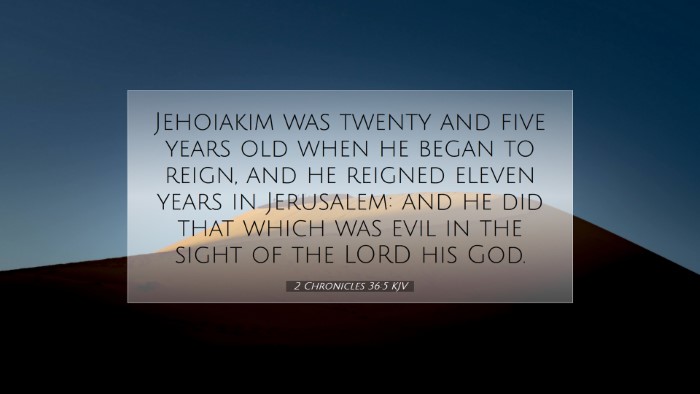Commentary on 2 Chronicles 36:5
Verse Text: "Jehoiakim was twenty and five years old when he began to reign, and he reigned eleven years in Jerusalem: and he did that which was evil in the sight of the LORD his God."
Introduction
The passage of 2 Chronicles 36:5 marks a significant moment in the history of Israel's monarchy. It serves as a transition between the reign of Jehoiakim and the impending doom that will soon envelop the nation due to their persistent disobedience to God. Commentators like Matthew Henry, Albert Barnes, and Adam Clarke provide profound insights into the implications of this verse, shedding light on the character of Jehoiakim and the overarching sovereignty of God in Israel's history.
Historical Context
The historical backdrop of Jehoiakim’s reign is one marked by political turmoil and spiritual decline. After the reign of his father, Josiah, who was noted for his religious reforms, Jehoiakim’s leadership took a turn for the worse. Matthew Henry emphasizes that Jehoiakim's ascent to the throne was influenced by Egypt, as he was made king as a vassal to Pharaoh Necho following his father’s demise.
Albert Barnes points out the significance of Jehoiakim's reign during a time of Babylonian expansion and the prophetic warnings delivered through Jeremiah. The spiritual decay during his reign initiated a decline that would result in the Babylonian captivity.
The Character of Jehoiakim
Jehoiakim is characterized in this verse as one who "did that which was evil in the sight of the LORD." This assessment is critical, as it serves as a poignant reflection of Israel's leadership at the time. Adam Clarke remarks that Jehoiakim’s actions were not only politically motivated but deeply spiritually flawed, exhibiting a total disregard for the religious customs established under earlier reforms.
- Matthew Henry: Highlights that Jehoiakim’s reign was marked by oppression, injustice, and a rejection of God’s law.
- Albert Barnes: Discusses how Jehoiakim's alliances and policies often contradicted the commandments of God, leading the nation further into sin.
- Adam Clarke: Notes that Jehoiakim’s actions were a direct provocation to God's anger, setting the stage for the nation’s judgment.
Theological Implications
This verse encapsulates a critical theological theme regarding the sovereignty of God in human affairs. Matthew Henry conveys that despite Jehoiakim's evil reign, God remained in control, using even their sins to fulfill His divine plans. The verse serves as a reminder of the balance of free will and divine sovereignty in the unfolding narrative of salvation history.
Albert Barnes further develops this by illustrating that Israel's rejection of God’s guidance led to inevitable consequences - not only for the nation but particularly for their leaders. Jehoiakim’s choices resulted in suffering and loss for his people, emphasizing the gravity of leadership responsibilities in aligning oneself with God's will.
Conclusion: Lessons for Today
In summary, 2 Chronicles 36:5 serves as a stark warning against the consequences of disobedience and the peril of leadership that defies God. For pastors, students, and theologians, this passage encourages a deep reflection on the moral and spiritual obligations of those in positions of authority.
Adam Clarke urges readers to consider the legacy of Jehoiakim as a cautionary tale, reminding us that a leader's actions reverberate through generations.
This commentary encourages believers to remain vigilant in their spiritual lives and to seek alignment with God's purpose, lest they, like Jehoiakim, face the repercussions of defiance against the divine will.


